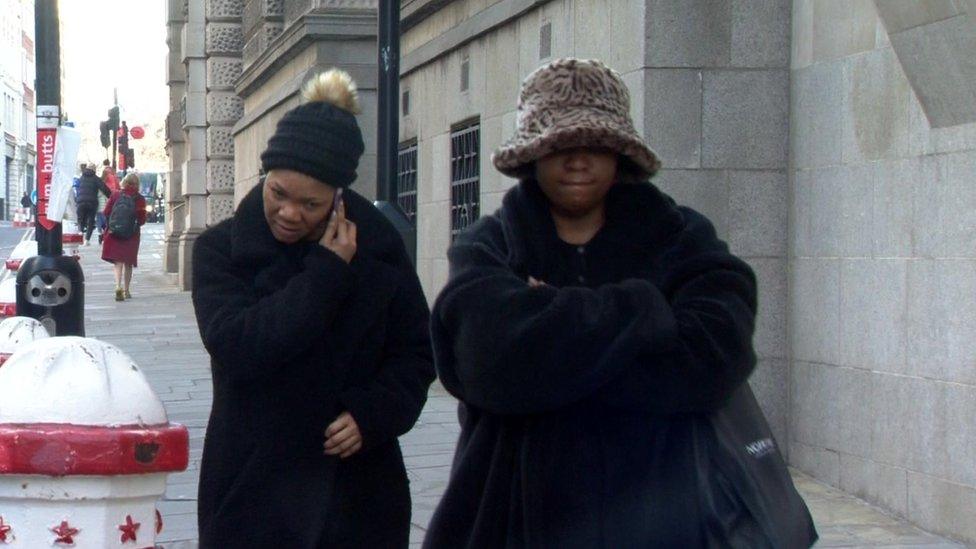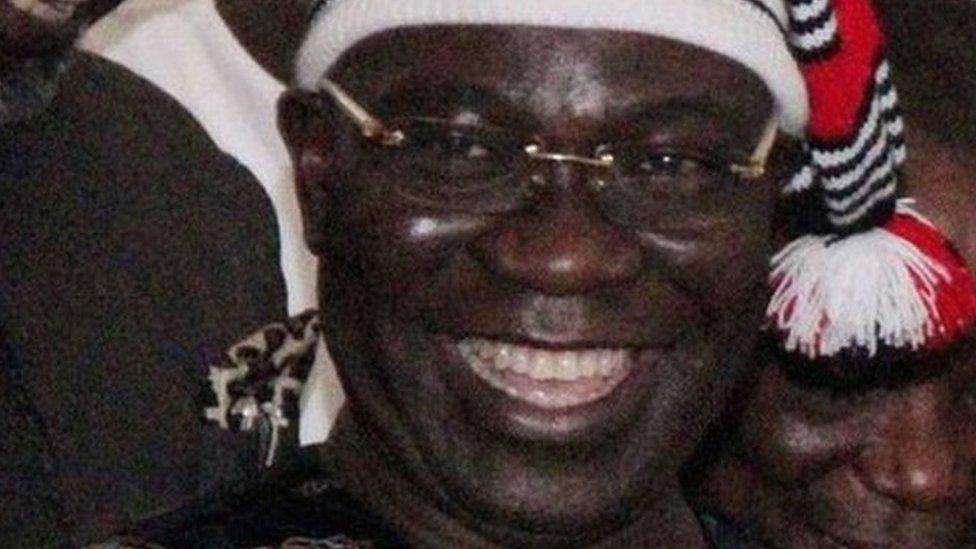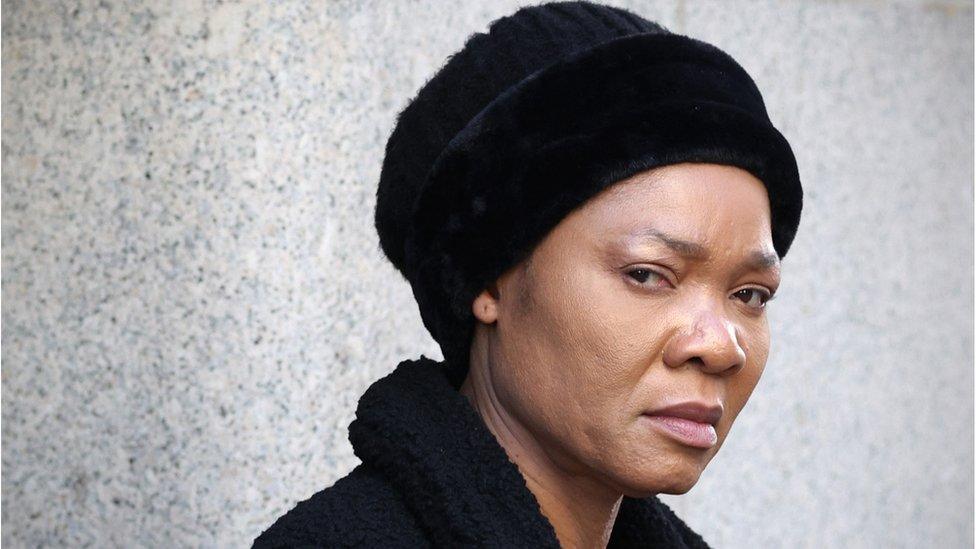Nigerian senator and wife on trial over alleged organ donation plot
- Published

Defendants Beatrice Ekweremadu (l) and Sonia Ekweremadu outside the Old Bailey
A Nigerian senator is on trial charged with exploiting a 21-year-old to come to London and donate a kidney.
Ike Ekweremadu, his wife Beatrice, their daughter Sonia, 25, and an associate, Dr Obinna Obeta, 50, allegedly broke modern slavery laws.
The Old Bailey heard on Monday that Mr Ekweremadu illegally paid a street trader from Lagos, to travel to the UK, for a donation to help Sonia, who suffers from a kidney disease.
The defendants deny the charges.
Opening the case, prosecutor Hugh Davies KC said Mr Ekweremadu's "status and influence had produced a significant degree of wealth".
The family from Willesden Green, north-west London, had "international connections," he said.
Sonia Ekweremadu's condition, he said, could have been alleviated or cured by a kidney transplant, and the family was "close, open and loving", with a "direct interest in Sonia's medical treatment."
But, he told the jury, rewarding someone for a kidney donation was illegal.
He said there was an "obvious risk that those providing organs for transplantation for reward are likely to come from the poorest and most vulnerable sections of society."
The defendants have been charged under modern slavery legislation which makes it an offence to "arrange or facilitate the travel" of a person to the UK for exploitation.
This offence carries a higher potential sentence of life, compared to a maximum of three years for illegally making an organ donation.
The alleged victim, who cannot be named for legal reasons, was recruited from the street markets of Lagos, the court heard, where he had a cart and sold mobile phone parts.

Ike Ekweremadu has been a senator in Nigeria since 2003
He was from a remote village and did not know his exact age, so he "adopted" a date of birth which would make him around 22 now, jurors were told.
The court heard he was given medical tests in Nigeria to assess his suitability as a donor before being flown to the UK.
He was allegedly offered the equivalent of £2,400 plus the promise that he could live and work in the UK.
"To him", Mr Davies said, "a street trader from Lagos, these sums and rewards were significant."
Jurors were told the alleged donor did not understand until his first appointment with a consultant at the Royal Free Hospital that he was there for a kidney transplant.
He was said by the consultant to have "limited understanding" of what he was there for and was "visibly relieved" on being told the transplant would not go ahead, the court heard.
Mr Davies told the jury that no potential donor would have done it without some form of reward.
He said that "elaborate steps were taken to create the wholly false impression that [the alleged victim] and Sonia Ekweremadu were cousins."
"None of this would have been necessary if this was a straightforward, genuine, altruistic kidney donation. It was not. It was criminal."
"In the real world, altruistic donors are an exceptionally rare commodity."
They were, Mr Davies said, "often young, intrinsically economically disadvantaged young men."
He said that Mr Ekweremadu and his associates began a search for a donor among "economically vulnerable people" in Nigeria with the right blood and genome types.
Candidates were invited to the Nigerian capital Abuja for testing, the court heard.

Beatrice Ekweremadu, wife of Nigeria's former deputy senate president, Ike Ekweremadu
The alleged victim was recruited by a previous organ donor he knew from the street market and plans were made to bring him to the UK, including obtaining a passport, jurors were told.
The potential donor for Sonia Ekweremadu believed he was undergoing medical tests as part of a visa application to go to London to work, the prosecution said.
'Tenuous relationship'
Jurors heard he was granted a visa by the Home Office in London in January 2022.
On being told about this by Dr Obinna Obeta, allegedly the Ekweremadu's fixer in Nigeria, he said: "Wow! Thank you very much sir, I really appreciate you", according to phone messages obtained by police.
The court also heard Sonia Ekweremadu began calling the 21-year-old, to "get familiar" with him before he flew to London in February.
On arrival the potential donor began meeting doctors at the Royal Free hospital in Hampstead, north London, Mr Davies said.
A specialist, Dr Peter Dupont who met the alleged trafficking victim, became concerned about the donation.
He believed the young man's maturity, age and ethnicity put him at risk of long term complications should he donate a kidney, the jury heard.
The man's relationship with the recipient was "tenuous", the doctor concluded.
'They had to lie'
Mr Davies said the defendants' conspiracy involved "detailed lies" that there was a family relationship between Sonia Ekweremadu and the alleged victim."
"A relatively distant family member acting altruistically is one thing. A complete stranger from Lagos coming from a position of economic disadvantage would have been seen for what it was, a donation for reward."
"They had to lie, and did."
The court was told the donor was bought clothes so that photos could be taken to create a false "backstory".
He was given a "drip feed of money".
"They had to control him and his documents right up to the point where the transplant took place. To protect their investment," Mr Davies said.
"He was not picked because of his extraordinarily selfless altruism, he was picked because he was a physical and biological match."
Mr Davies said whether the donor agreed to travel to the UK for that purpose didn't matter because victims of trafficking couldn't legally agree to their own exploitation.
The three Ekweremadus and Dr Obeta, from Southwark, deny conspiring to arrange or facilitate the travel of the young man with a view to exploitation between 1 August 2021 and 5 May 2022.
The trial continues.
